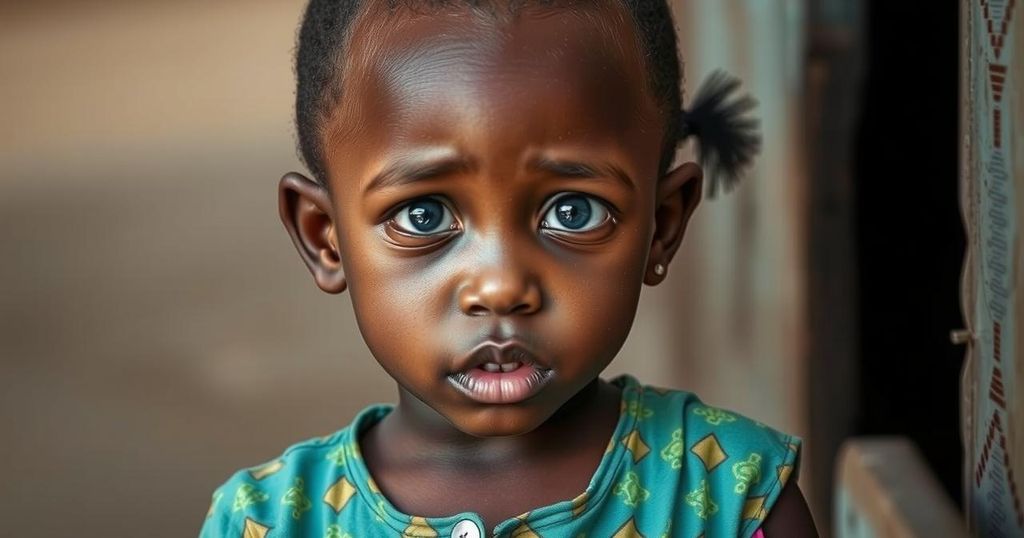World news
AFRICA, CONGO, CONGO (KINSHASA), DEMOCRATIC REPUBLIC, DEMOCRATIC REPUBLIC OF CONGO, DISEASE, DISEASE OUTBREAK, DISEASE OUTBREAKS, FOOD POISONING, GHEBREYESUS, KINSHASA, KWANGO, NATURAL DISASTERS, PANZI, PUBLIC HEALTH, REUTERS, TED, TEDROS ADHANOM GHEBREYESUS, USA TODAY, WHO, WORLD HEALTH ORGANIZATION
Lena Nguyen
0 Comments
Outbreak of Mysterious Illness in Congo: Over 400 Infected, Primarily Children Affected
A mysterious illness in the Democratic Republic of Congo has infected over 400 individuals, resulting in 31 deaths, primarily among children. Symptoms include fever and respiratory issues. The outbreak coincides with reports of malnutrition and challenges in healthcare access due to civil unrest. WHO is investigating the situation to identify the disease.
In the Democratic Republic of Congo, over 400 individuals have contracted a mysterious illness that has claimed 31 lives, predominantly affecting children, as reported by the World Health Organization (WHO). The outbreak, which has recently come to light, is concentrated in the Kwango province. Initial symptoms resemble those of influenza, including headaches, cough, fever, respiratory issues, and anemia. Notably, many patients are also suffering from malnutrition, which may exacerbate their vulnerability to disease.
WHO Director-General Tedros Adhanom Ghebreyesus announced that ten out of twelve initial samples from afflicted individuals tested positive for malaria, suggesting the possibility of co-infections. A team of experts has arrived at the remote health zone of Panzi, although travel challenges during the rainy season have delayed their arrival. Local reports had indicated higher fatalities than what the official figures suggest, highlighting the urgent need for situational awareness and effective intervention.
Access to the affected area is critically hindered by poor infrastructure and ongoing violence, further complicating efforts to treat patients and identify the disease’s causative agent. WHO is conducting further testing on newly collected samples in hopes of pinpointing the infectious agents involved, which may include strains of flu, pneumonia, similar coronaviruses, or measles. Moreover, the organization is assessing how the illness spreads and is keen to uncover any additional cases in the vicinity.
Compounding these challenges, the Democratic Republic of Congo continues to struggle with its healthcare system amid civil unrest. Concurrently, investigations into this new illness are being paired with responses to mpox outbreaks impacting the region, with significant reported cases and fatalities due to that disease. This combination of health crises underscores the pressing need for international and local health collaboration to address the multifaceted challenges occurring in the area.
The outbreak of a mysterious illness in the Democratic Republic of Congo has been categorized as a significant health crisis, particularly in the remote Kwango province. Compounded by a weak healthcare system and ongoing civil conflict, these challenges severely limit healthcare access and response capabilities. The WHO is conducting extensive investigations to identify the disease and improve response strategies. Concurrent health crises, such as mpox, exacerbate the overall situation, necessitating a concerted effort among health organizations.
In summary, the outbreak in the Democratic Republic of Congo poses a grave public health challenge, primarily affecting children and exacerbated by malnutrition and a fragile healthcare system. WHO’s efforts to identify the causative agents and understand transmission dynamics are crucial at this juncture. Additionally, the ongoing mpox crisis highlights the need for a robust and coordinated health response to effectively manage and mitigate the impact of these diseases.
Original Source: www.usatoday.com




Post Comment